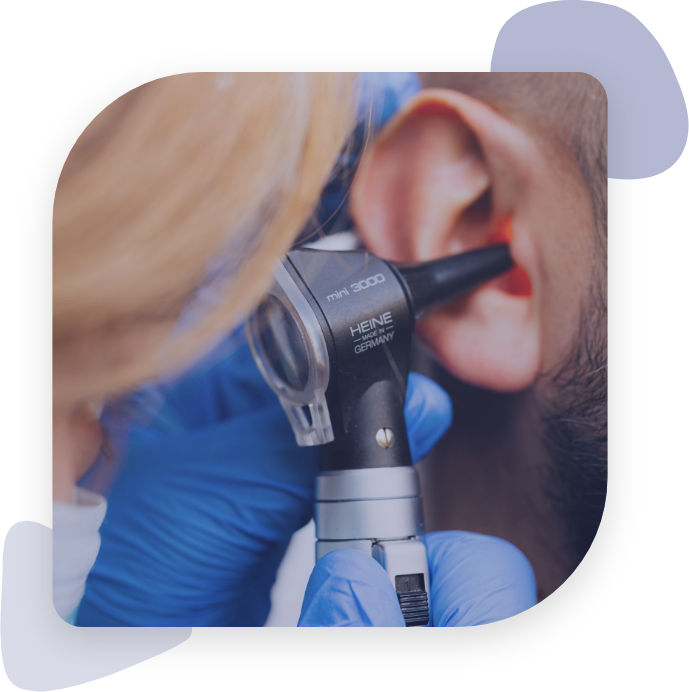Sudden Hearing Loss
Hearing loss is usually attributed to aging or being exposed to events with loud sounds, like shooting and concerts, but what if you experience sudden hearing loss without any obvious,
identifiable cause? Sudden Sensorineural Hearing Loss (SSHL) or sudden deafness, is an unexplained, rapid hearing loss that happens all at once or over a couple of days.

SUDDEN HEARING LOSS SYMPTOMS
Symptoms of sudden hearing loss may include dizziness, muffled sounds, difficulty of hearing high-pitched sounds or those in the high frequencies, loss of balance, not being able to isolate some sounds with background noise, and tinnitus.
People who experience sudden hearing loss may also notice dizziness, a feeling of fullness in the ear and/or a ringing in the ears, commonly known as tinnitus. Most of these existing conditions or possible causes of sudden hearing loss are accompanied by symptoms that can point to the correct diagnosis. Another thing to consider when trying to deal with sudden hearing loss is if the hearing loss happens in both or just one ear.
For instance, if sudden hearing loss is experienced only in one ear, a doctor should try to rule out tumors on the auditory nerve as a possible cause. Meanwhile, an autoimmune disease may cause sudden hearing loss in either one or both ears so doctors will also be on the lookout for that.
PREVENTING SUDDEN HEARING LOSS
LIMIT NOISE EXPOSURE
HAVE REGULAR CHECKUPS
Regular hearing tests are recommended especially if you work in a noisy environment. If it can be established that you have already lost some of your hearing, you and your doctor can work together to take steps to prevent further hearing loss. Having regular hearing check-ups can also be very helpful in case you experience sudden hearing loss because it will be easier to pinpoint the cause thanks to your updated medical records. For any hearing and balance concerns, we are here to help.
LESS RECREATIONAL RISKS
SUDDEN HEARING LOSS NEEDS IMMEDIATE ATTENTION
WHAT CAUSES SUDDEN DEAFNESS?
Patients usually notice a decline in their sense of hearing after waking up from a night’s rest or hearing a sudden “pop”. Sudden hearing loss is unexplainable and 10% of the cases have been linked to other illnesses and underlying clinical conditions.
People who suffer from sudden hearing loss usually put off seeing an audiologist or a doctor thinking that this is just something that will pass – which is a very big mistake.
HOW IS SUDDEN DEAFNESS DIAGNOSED?
Individuals who suffer from sudden hearing loss need to set an appointment with an audiologist or Ear, Nose and Throat (ENT) specialist. You need to get a proper diagnosis to avoid putting your hearing at greater risk of not being able to return back to normal. Sudden hearing loss may not be a critical medical emergency but doctors recommend that people who notice a sudden decline in their hearing need to undergo hearing tests because the earlier it is attended to, the better the outcome and the higher chance of getting the hearing back to normal.
When learning about a patient’s sudden hearing loss symptoms, a doctor needs to rule out if this is conductive hearing loss, a hearing loss that’s caused by an ear obstruction such as earwax or fluid build-up. For cases of sudden hearing loss without an identifiable or obvious cause, a pure tone audiometry test is carried out. This test is carried out a few days after the onset of sudden hearing loss and may be used to identify sensorineural hearing loss.
Pure tone audiometry can also measure the range of hearing that has been lost. Aside from auditory tests, a doctor may also need to carry out additional tests to try to determine or measure other underlying causes for the sudden hearing loss. These may include imaging – magnetic resonance imaging or MRI, blood tests and balance tests.
SUDDEN HEARING LOSS: HOW IS SUDDEN DEAFNESS TREATED ?
The problem with sudden hearing loss is that it can be easily mistaken as temporary hearing loss. Some may think that it is just a symptom caused by fluid or earwax blockage that will clear in a couple of days. Medical treatment and intervention is needed in cases of sudden hearing loss because the symptoms in both cases are usually the same, so professional health care providers need to distinguish the symptoms to save the hearing as soon as possible. Any kind of hearing loss needs to be checked because it can affect anyone – an adult, students, men, women, babies, children, etc.
A couple of years back, steroids were administered in pill form. Fast forward to 2011 and a clinical study backed by NIDCD revealed that intratympanic injection of steroids proved to be as effective as oral steroids. After that study, doctors, otolaryngologists and audiologists started to prescribe intratympanic injections of steroids. Steroid injection in the inner ear is a good alternative for patients who want to avoid side effects of oral steroids or simply have a hard time swallowing pills.
Treatment for sudden hearing loss should be carried out as soon as possible to get the best effect and some doctors even decided to start the treatment even before all the results and blood work come back. You see, with sudden hearing loss, it is like working with a ticking time bomb. One second of delay may cause someone to lose their hearing permanently. If the treatment for sudden hearing loss is delayed for a month or more, the chances to reverse or reduce permanent hearing loss becomes thinner.
If the doctor finds out that the sudden hearing loss is caused by an infection, additional treatments may be given such as antibiotics. If ototoxic drugs, otherwise known as toxic to the ears, are discovered to be the cause of sudden hearing loss, a doctor may advise a patient to switch to another drug. If sudden hearing loss is caused by an autoimmune condition, doctors may prescribe drugs that aim to suppress the immune system.
SUDDEN HEARING LOSS -
A SMALL WINDOW OF TIME
The main reason that most people don’t think that sudden hearing loss is an emergency is because it may just be linked to something more ordinary. However, it is worth noting that medical specialists really emphasize that the delay of diagnosing and treating sudden hearing loss can increase the risk of permanent hearing loss.
Nobody really wants to lose their hearing, especially if it can still be prevented or recovered.An audiologist can diagnose sudden hearing loss and offer possibility for preventing further permanent impairment.

SUSCEPTIBILITY TO SUDDEN HEARING LOSS
Individuals who have exposure to certain drugs that treat severe infections or cancer can also be susceptible to sudden hearing loss. When you are in the emergency room or in a doctor’s clinic for sudden hearing loss, it would be best if you give the most detailed information as possible so they can rule out the cause. Giving the right and exact information can also play a big role in the effectiveness of your treatment.
The problem with sudden hearing loss is that it can be easily mistaken as temporary hearing loss. Some may think that it is just a symptom caused by fluid or earwax blockage that will clear in a couple of days. Medical treatment and intervention is needed in cases of sudden hearing loss because the symptoms in both cases are usually the same, so professional health care providers need to distinguish the symptoms to save the hearing as soon as possible. Any kind of hearing loss needs to be checked because it can affect anyone – an adult, students, men, women, babies, children, etc.
A couple of years back, steroids were administered in pill form. Fast forward to 2011 and a clinical study backed by NIDCD revealed that intratympanic injection of steroids proved to be as effective as oral steroids. After that study, doctors, otolaryngologists and audiologists started to prescribe intratympanic injections of steroids. Steroid injection in the inner ear is a good alternative for patients who want to avoid side effects of oral steroids or simply have a hard time swallowing pills.
Treatment for sudden hearing loss should be carried out as soon as possible to get the best effect and some doctors even decided to start the treatment even before all the results and blood work come back. You see, with sudden hearing loss, it is like working with a ticking time bomb. One second of delay may cause someone to lose their hearing permanently. If the treatment for sudden hearing loss is delayed for a month or more, the chances to reverse or reduce permanent hearing loss becomes thinner.
If the doctor finds out that the sudden hearing loss is caused by an infection, additional treatments may be given such as antibiotics. If ototoxic drugs, otherwise known as toxic to the ears, are discovered to be the cause of sudden hearing loss, a doctor may advise a patient to switch to another drug. If sudden hearing loss is caused by an autoimmune condition, doctors may prescribe drugs that aim to suppress the immune system.
Hear Better. Live Better.
-
130 S. State Road,
Suite 201 Springfield, PA 19064 -
905 West Sproul Rd,
Suite 201 Springfield, PA 19064 - 610-438-5203
